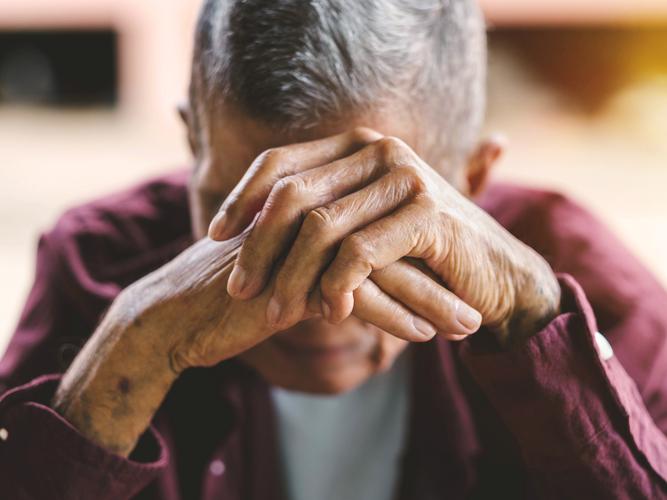CHICAGO, IL – Many people mistakenly believe that Americans become malnourished because they don’t have the financial resources to buy food; however, malnourishment is usually caused by dozens of interconnected factors like disease, prescription medications, poor nutrient absorption, difficulty chewing or swallowing, and depression.
Malnourishment can happen at any age, but seniors are at the highest risk of malnourishment. Elderly malnutrition is a hidden epidemic that affects almost 1 out of every 2 older adults, according to the Alliance for Aging Research.
Elderly nutrition problems can be difficult to recognize but need to be taken seriously. The effects of malnutrition in adults can be life-threatening, especially in elder adults. Seniors can be malnourished even if they are a normal weight or overweight — even if they do not look malnourished or sick.
Here is what seniors, caregivers, and family members need to know about malnutrition in elderly adults including what causes malnourishment, how it can be recognized, and treatment options.
What is malnutrition?
Malnutrition refers to deficiencies, excesses or imbalances in a person’s intake of energy and/or nutrients, according to the World Health Organization. Malnutrition most often refers to any of the following that result in an adverse effect on someone’s health, function, or body composition:
- Caloric deficiency
- Deficiency of nutrients, vitamins or minerals
- Imbalance of nutrients, vitamins or minerals
Someone may be malnourished if they aren’t getting enough calories and experience involuntary weight loss; additionally, it may refer to someone who is not getting enough protein, vitamin C or other necessary nutrients.
The most common form of malnutrition in seniors is protein-energy malnutrition or protein-energy undernutrition.
Why does elderly malnutrition happen?
As we age, we usually become more sedentary. Combined with natural changes to body composition and bodily functions, this leads to reduced muscle mass and increased body fat. While this naturally comes with a reduced caloric need, seniors are at high risk of malnutrition.
Nutritional concerns for elderly people are complicated. Along with natural changes in appetite and nutritional needs, seniors often have health concerns that make it hard to get the nutrition they need. Geriatric nutrition is also complicated by medications and unique issues like bereavement, depression, finances and living conditions.
What are the causes and risk factors for malnutrition in the elderly?
Malnutrition in older adults is a complicated issue. Most malnourished seniors are dealing with interconnected issues that contribute to malnourishment. Natural changes that come with aging already contribute to nutritional concerns for elderly people, but disease, medical interventions and external factors can combine to make malnutrition a greater threat.
There are many risk factors for malnutrition in elderly people ranging from environmental to psychological and physiological. Other factors can include:
- Living conditions
- Financial resources
- Accessibility of food
- If the senior has a social and family network
Malnutrition in nursing homes
Unfortunately, older adults living in a long-term care setting are at high risk of becoming malnourished. According to estimates, 12-50% of seniors in hospitals are malnourished compared to 23-60% of seniors in nursing homes and other long-term care facilities. Some estimates place the rate of malnutrition in nursing homes at 40 to 85% (American Journal of Nursing).
If you suspect a loved one in a nursing home is malnourished, it’s critical to take action quickly. Just as dehydration in the elderly is dangerous, malnourishment can be a sign of nursing home neglect. Nursing homes have the duty to provide residents with adequate medical care and supervision which includes recognizing risk factors for malnutrition, assessing patients regularly, developing customized treatment plans and treating malnourishment quickly to prevent serious complications. Unfortunately, neglect is often the result of understaffing in nursing homes.
Malnutrition in the elderly is sadly a common problem that’s often missed not just by family members, but even medical professionals. There are various validated tests for nutritional screening, but the signs and symptoms in adults are frequently missed which can increase the risk of mortality and morbidity, reduce the quality of their life and cause more frequent and longer hospital stays.
Important symptoms of malnutrition in the elderly include:
- Unintended weight loss (5% or more of body weight) even in overweight people
- Reduced strength
- Weakening hand grip or swelling in the belly, ankles or legs
- Unsteady gait
- Clothes appearing baggy
- Dentures that look like they are floating in the person’s mouth or changes in how dentures fit
- Eating less at meals than usual or getting sick more frequently
- Wounds that are slow to heal
- Frequent or recurring diarrhea, vomiting or nausea
Consequences of malnutrition in the elderly
Potential consequences of malnutrition in the elderly include:
- Increased risk of falls and/or greater risk of hospitalization
- Longer hospital stays
- Loss of independence
- Increased mortality
- Increased morbidity
- Worsening of other existing conditions including dementia
- Reduced ability to heal from injuries and illnesses like sepsis, burns, and surgery
Death from malnutrition in the elderly is the biggest risk. Unintentional weight loss is a huge predictor of mortality with 9% to 38% of people passing away within one to two and a half years of losing 5% or more of their body weight. People who experience 5% or more of unintended weight loss within one month have a 4x higher rate of mortality (National Library of Medicine).
The attorneys at the Dinizulu Law Group are here to help
It’s important to contact a nursing home neglect lawyer to assist you in holding the negligent nursing home accountable to recover compensation for the harm your loved one has endured.
The Dinizulu Law Group is a Chicago law firm specializing in nursing home abuse and neglect. Our skilled attorneys represent nursing home residents and their families throughout Illinois. Contact our law firm today at (312) 384-1920 to discuss your case and receive a free consultation.



